John Coulthart's Blog, page 11
February 26, 2025
The Return, a film by Jerzy Kucia
“Jerzy is the greatest among the living—the greatest Polish author of animated films that is still alive.” So says Piotr Dumala, a formidable animator in his own right, in a video discussion of Jerzy Kucia’s films. The first of these, The Return (1972), is collected on Studio Miniatur Filmowych, a YouTube channel devoted to Polish animation. My complaints about YouTube are legion but the place is still worthwhile when it allows channels like this one to exist. The same goes for the channel devoted to films from the Zagreb Studios. The only trouble with these outlets is a lack of translation for the films that feature dialogue.
This isn’t an issue with The Return, however, a wordless account of a nocturnal train journey undertaken by a shuffling man in a cloth cap. Stills don’t convey the remarkable sense of verisimilitude that Kucia creates with the patterns of light flashing over the walls and against the windows of the unlit carriage. The whole piece is meticulously observed, and a reminder to keep searching for the director’s other films.
Previously on { feuilleton }
• Crime and Punishment, a film by Piotr Dumala
• Walls, a film by Piotr Dumala
• Academy Leader Variations
February 24, 2025
The art of Nikolai Petrovich Theophilaktoff, 1878–1941
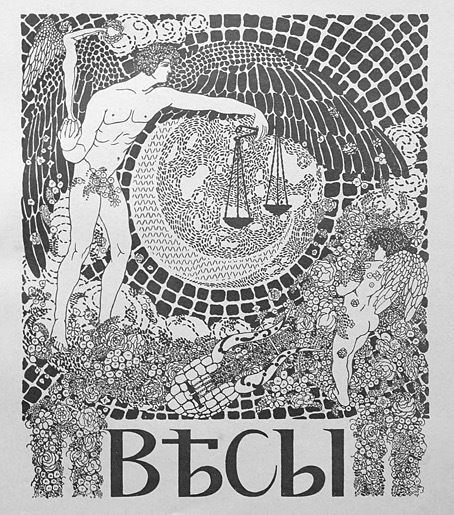
I’m taking the biographical details about this Russian artist from a Christie’s listing, accuracy being of particular importance to auction houses. The trouble with searching for information about Nikolai Theophilaktoff is that he’s one of those Russians whose name isn’t common enough to exist in a settled non-Russian form, so you may find his drawings credited to “Nikolai Feofilaktov” or even “Nikolai Theophylactus”. Whatever the spelling of his surname, Theophilaktoff is remembered today for illustrations with a distinct Beardsley influence, which is how he came to my attention. Aubrey Beardsley only had a few years for his art to impress itself on the world but he was known in Russia during his lifetime; Sergei Diaghilev was especially enthusiastic, using his position as editor of arts journal Mir Iskusstva (World of Art) to promote Beardsley’s work after the artist’s death. A later Russian arts journal, Libra, maintained the enthusiasm, devoting an entire issue to Beardsley in 1905. It was reading about Libra that led me to Nikolai Theophilaktoff, an artist who was sufficiently beguiled by Beardsley’s drawings to embark on his own variations on the Beardsley style.
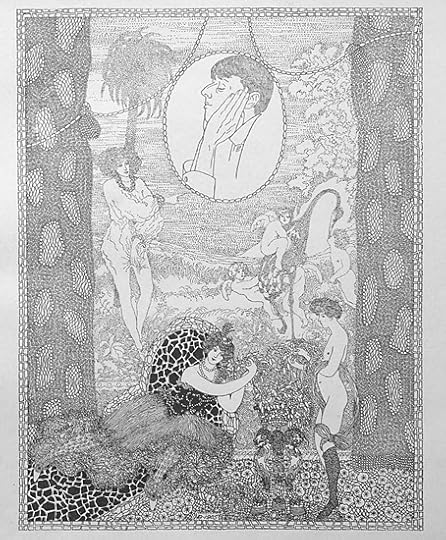
Theophilaktoff’s cover art for the Beardsley issue of Libra, November, 1905.
You can usually divide Beardsley’s followers into two groups: those who pick up on the striking contrasts that Beardsley created using areas of solid black against the white of the paper—Harry Clarke, Will Bradley and John Austen are good examples of this type. A second class would be those who favour the delicate, filigree style of Beardsley’s illustrations for The Rape of the Lock—Alastair (Hans Henning Voigt) and Nikolai Theophilaktoff are in this category. (Harry Clarke was also an expert filigree-ist but Clarke is really in a class of his own.) If you accept this artistic division it’s notable that the weaker artists are in the latter class. It’s easier to disguise deficiencies of figure drawing, say, with abundant stippling and decoration than it is when using nothing more than fine lines and masses of black ink. Theophilaktoff’s accomplishments are very uneven but they’re also rare examples of Beardsley’s style of Decadent art in a country that would soon have no time for such a thing at all.
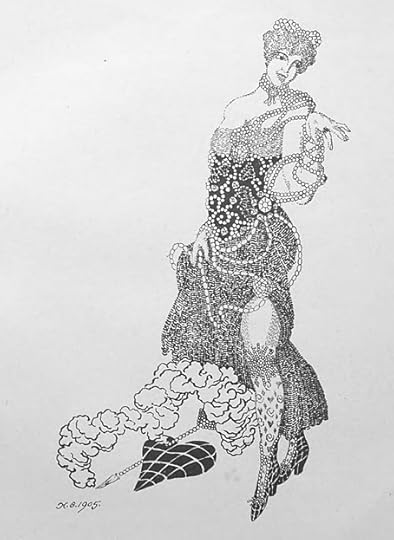
Most of the pictures here are from a book, 66 Dessins (1909), which collected many of the Theophilaktoff drawings published in Libra. The pornographic drawing at the very end is a swipe from an auction listing. Also near the end are drawings for Wings (1906), a novel by Mikhail Kuzmin which is one of the first literary works to openly deal with same-sex relationships. As for Libra, I thought copies of the magazine might be impossible to find but the trusty Internet Archive has what seems to be a complete run here. Mir Iskusstva, which seems rather staid by comparison, may also be found at the Internet Archive in a series of bound volumes.
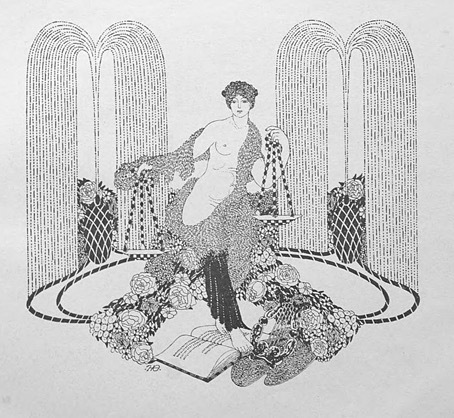
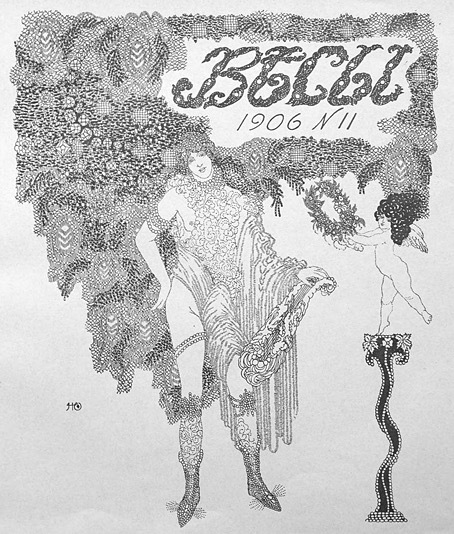
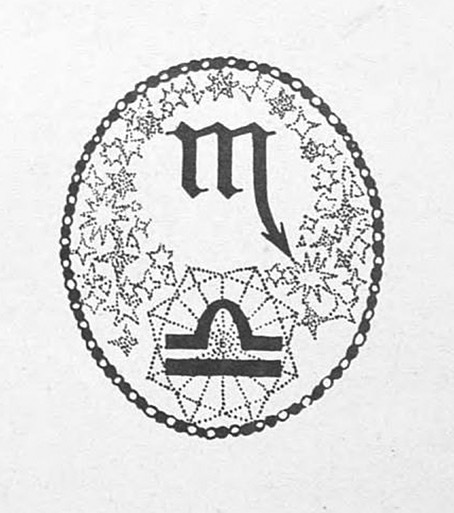
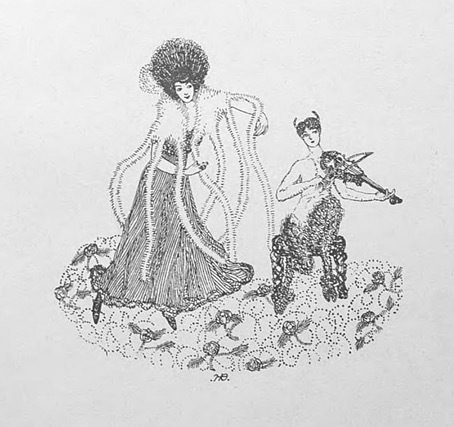
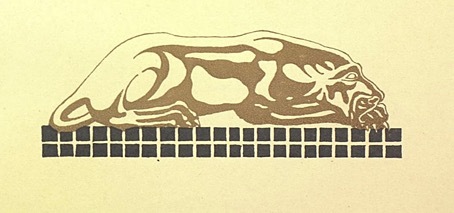
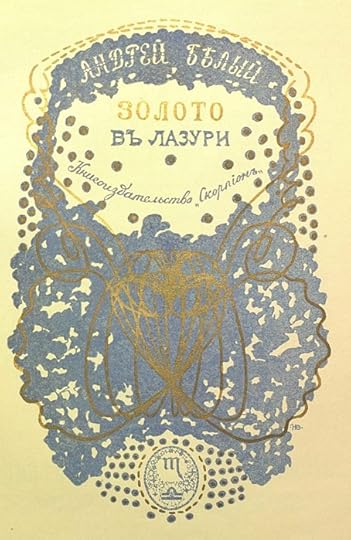
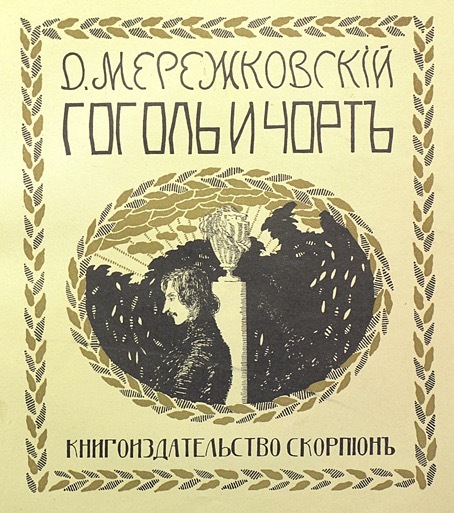
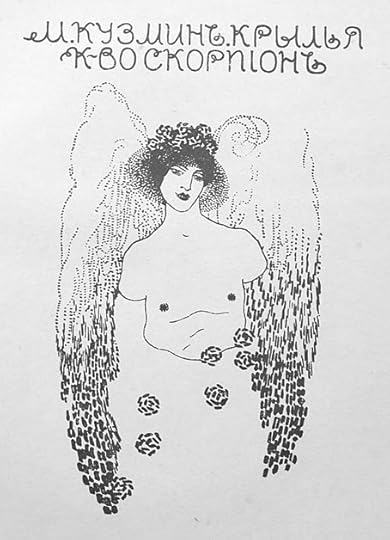
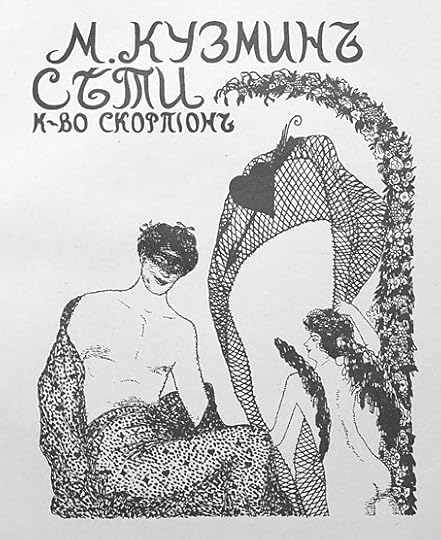
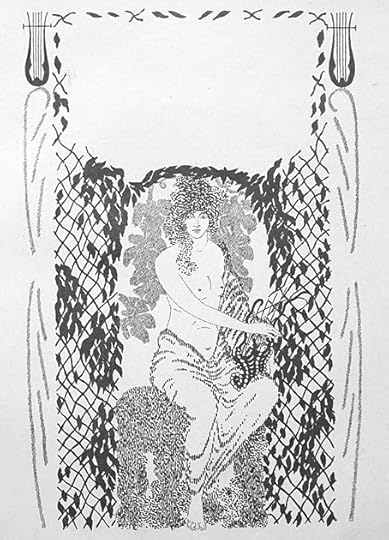
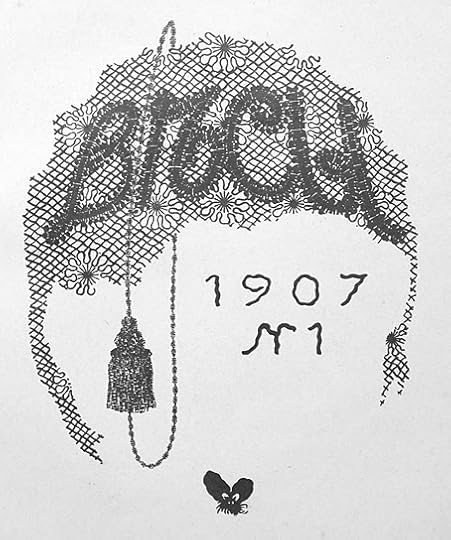
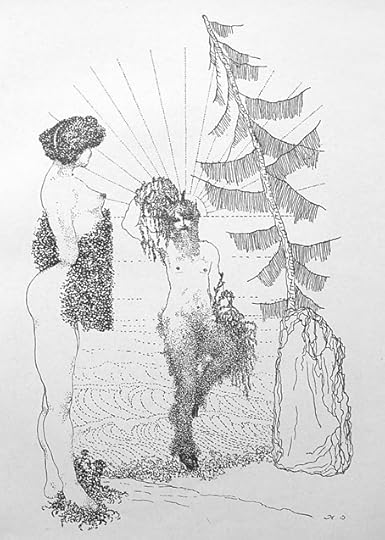
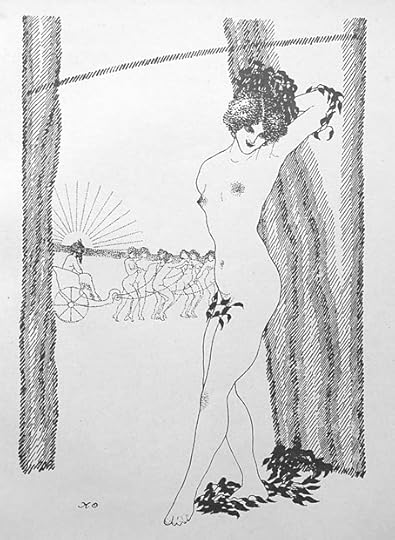
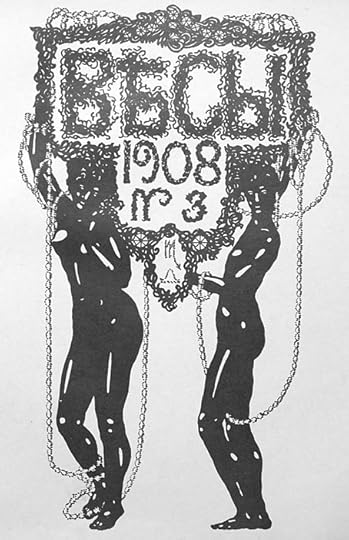
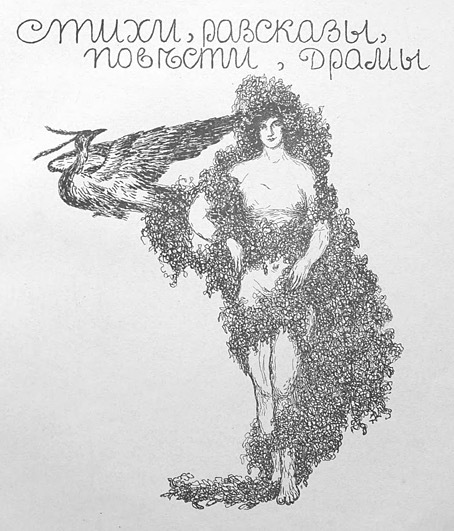
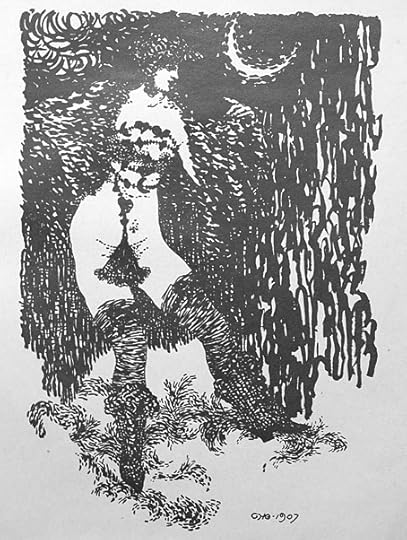
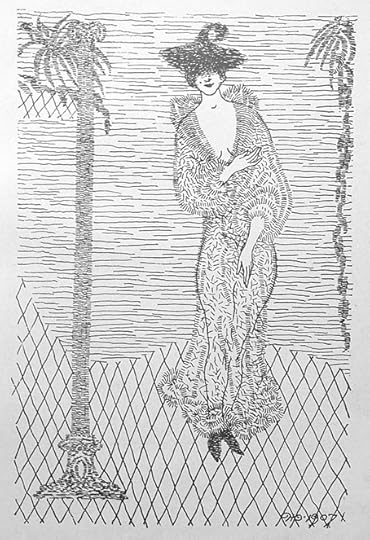
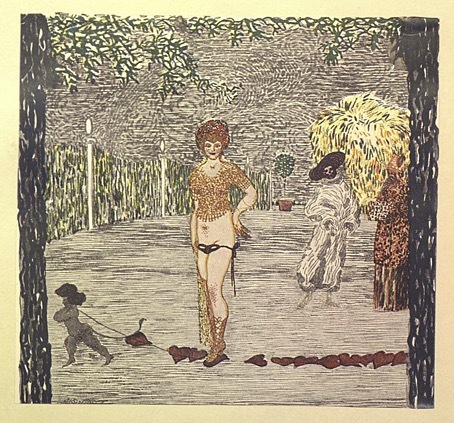
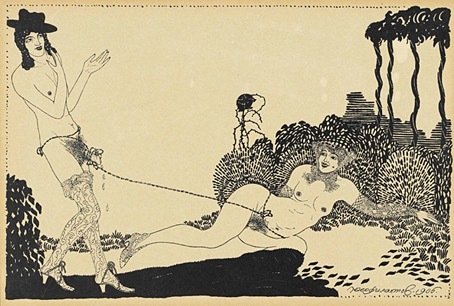
Elsewhere on { feuilleton }
• The illustrators archive
Previously on { feuilleton }
• The art of Konstantin Somov, 1869–1939
• Diaghilev’s World of Art
February 22, 2025
Weekend links 766

The Fantod Pack (1995): a Gorey take on the Tarot deck.
• A happy 100th birthday to Edward Gorey. I was hoping to link once again to Gorey’s appearance on the Dick Cavett Show from 1977 (a rare TV interview) but it’s one of those things that’s no longer available at YouTube. You can always browse Goreyana instead. Meanwhile, there’s this in Scotland: In Gorey Detail: Celebrating An American Friend At Custom House, Leith. A tribute exhibition which is running in Edinburgh for this week only.
• “A blisteringly frank and triple X-rated chat with Peter Berlin”. A blisteringly hyperbolic headline for a discussion between Ted Stansfield and Peter Berlin, the self-invented sex object of the 1970s.
• This week in the Bumper Book of Magic: Smoky Man posts my replies to his questions about the creation of the book’s Rainy Day and Kabbalah sections.
• Tricky’s Maxinquaye was released 30 years ago this month. David Bennun revisited the album five years ago.
• At Colossal: Felines evoke ‘A Floating World’ in Tùng Nâm’s whimsical illustrations.
• New music: Gloam by Emptyset, and The Mount Hibiki Tapes by Mount Shrine.
• Mix of the week: A mix for The Wire by Polonius.
• Steven Heller’s font of the month is Steam.
• Last Of The Steam Powered Trains (1968) by The Kinks | Steam Megawatt (1979) by Tod Dockstader | Building Steam With A Grain Of Salt (1996) by DJ Shadow
February 19, 2025
Hon by Yasmine Hamdan
If you’ve seen Jim Jarmusch’s vampire film, Only Lovers Left Alive, you may remember the scene near the end where the film stops for a moment in Tangier that so that Yasmine Hamdan, a Lebanese singer, can perform one of her songs. I’ve got the soundtrack CD which includes Hal, the song she sings, but despite my predilection for Middle Eastern music I’ve been remiss in chasing down the albums that she’s released since. Hon is a new Yasmine Hamdan song, her first in a while if the YT comments are correct (her last album was in 2018), with an animated video credited to Khalil. The video is a wholly animated piece which is one reason why it’s featured here; as I’ve said in the past, I lost patience with the live-action video format years ago but still like those that use animation provided the technique is well-deployed.
The song itself is a political one, you might say inevitably so given the singer’s background and the state of current events. No prizes for guessing what the “tiny country with a gaping wound” refers to. Khalil’s animation uses its variety of collaged objects to spell out Arabic words. Is one of these a fleeting reference to the opening shots of Sergei Parajanov’s The Colour of Pomengrates? Maybe. The link to the song came via Animation Obsessive, a favourite Substack which teaches me something new with every post. The latest instalment concerns Robert Sahakyants, an Armenian animator described as a Soviet hippy, or the closest you could get to such a thing in the Soviet Union of the 1970s. That’s another lead to go chasing after.
February 17, 2025
Gwenaël Rattke record covers

Muscle Up (2015) by Patrick Cowley.
This post is partly a reminder to myself that I’m still missing the last two Patrick Cowley album releases on the Dark Entries label. Dark Entries have distinguished themselves over the past few years by compiling selections from Cowley’s previously unreleased tape archive. Many of the recordings were made in the years before Cowley established himself as a producer of Hi-NRG disco hits, long pieces of instrumental electronic music which are closer to the typical electronica of the 1970s than the club music he became known for. This didn’t prevent his early recordings from being used as soundtracks for gay porn films, however, a connection that Dark Entries acknowledge in the packaging for their first three Cowley releases: School Daze (2013), Muscle Up (2015) and Afternooners (2017). The fourth album in the series, Mechanical Fantasy Box (2019), was released in tandem with a book of the same name, a journal of Cowley’s sexual encounters during the late 70s. The book and the albums from Muscle Up on have all featured art and graphics by Gwenaël Rattke, a German artist who uses traditional collage methods to repurpose imagery and graphics copied from gay magazines and porn publications of the 1970s and 1980s. The last time I looked at Rattke’s work I wasn’t aware that he’d created more album art so this post gathers a few additional examples along with his designs for Dark Entries.

Lesbians On Ecstasy (2004) by Lesbians On Ecstasy.
I always like to see an accurate pastiche, and Rattke’s pastiches are close enough to their targets to be mistaken for products of the period they resemble, especially when assisted by fonts like Quicksilver, Stop, Sinaloa, and Motter Textura, all of which are redolent of the disco decade. Creating collages with scissors, paper and what looks in places like Risograph reproduction also helps with the period authenticity. You could create work like this with wholly digital means but if you did you’d have to do spend time disguising the absolute precision of those techniques.

We Know You Know (2007) by Lesbians On Ecstasy.

Liquidation (2015) by Liquid G.

Patrick Cowley – Afternooners (2017) by Patrick Cowley.

Hot Rod To Hell (2019) by Roy Garrett & Man Parrish.

Mechanical Fantasy Box (2019) by Patrick Cowley.

Laurie Spiegel – Clockworks Remixes (2022) by Laurie Spiegel.

Malebox (2022) by Patrick Cowley.

From Behind (2024) by Patrick Cowley.

Deep Entries: Gay Electronic Excursions 1979-1985 (2024) by Various Artists.

Kickin’ In (2024 Remaster) by Patrick Cowley.
Elsewhere on { feuilleton }
• The album covers archive
• The gay artists archive
Previously on { feuilleton }
• Quicksilver
• School Daze by Patrick Cowley
February 15, 2025
Weekend links 765

An Ideal Life (1950) by Leonor Fini.
• “…there has not been anything like a general, systematic discussion of what other, semantically different kinds of languages there can be, and the philosophical consequences of this. If reality has a certain structure, it would be a miracle if familiar languages contain all the resources to capture this structure.” Matti Eklund on the potential nature of alien languages.
• “As cats evolved from feral ratters into beloved Victorian companions, a nascent pet-food economy arose on the carts of so-called ‘cat’s meat men’. Kathryn Hughes explores the life and times of these itinerant offal vendors, their intersection with a victim of Jack the Ripper, and a feast held in the meat men’s honour, chaired by none other than Louis Wain.”
• Kinoteka, the UK’s Polish Film Festival, revealed its 2025 programme this week. Among the events will be a screening of the new Quay Brothers film, Sanatorium Under the Sign of the Hourglass (extract), at BFI Imax in London. Also in London (and with free entry), Swedenborg House will be hosting an exhibition of the Quays’ film decors.
• In a recent comment here I said that some of Charles Williams’ metaphysical novels were like John Buchan thrillers with an occult twist. At Wormwoodiana G. Connor Salter investigates the possible connections between the two writers.
• Alice Coltrane & Carlos Santana, 1974: Lossless downloads of previously unissued recordings from the Illuminations album and a live set with John McLaughlin at San Francisco’s Kabuki Theater.
• “‘The Köln Concert is the hit he wants to disown’: why Keith Jarrett shunned two new films about his unlikely masterpiece.”
• New music: Shards by Tim Hecker; and Some Other Morning by Memory Effect.
• Mix of the week: DreamScenes – February 2025 at Ambientblog.
• At Colossal: Outdoor light installations by Lachlan Turczan.
• Galerie Dennis Cooper presents…Paul Laffoley.
• Cat’s Eye (1977) by Van Der Graaf | Cat’s Eye (2015) by Patrick Cowley | No Cat’s Eyes (2017) by The Belbury Circle
February 12, 2025
Suggestions in Design by John Leighton

Among the new book arrivals at the Internet Archive is this study of global design and ornamentation, with art by John Leighton and text (or “descriptive and historical letterpress”) by James K. Colling. Suggestions in Design was published in 1880, with the pictorial matter having been available for many years as part of Dover Publications’ Pictorial Archive series. I don’t have a copy of the reprint, however, so this was a useful find. Leighton’s illustrations are black-and-white throughout, and all separated from each other, which is what you want if you’re looking for a design you may use yourself. The illustrations are also carefully done, something you can’t always say about the smaller books of this type.

The Victorian era is where design history begins. Suggestions in Design follows the structure of Owen Jones’ landmark study, , ranging across the world and through the ages to demonstrate the evolution of decoration and sculptural form. Leighton ends the book with several pages of his own designs. Browse it here or download it here.

















Previously on { feuilleton }
• Moderne Malereien, 1903
• Das Thier in der Decorativen Kunst
•
•
• Buchschmuck und Flächenmuster by Max Benirschke
• Christopher Dresser’s Studies in Design
• Christopher Dresser’s Art of Decorative Design
• Kunstgewerbliche Schmuckformen für die Fläche
• Album de la décoration
•
• Dekorative Vorbilder
• Combinaisons Ornementales
• Charles J Strong’s Book of Designs
•
•
February 10, 2025
A Day of Expo 70

Poster design by Yusaku Kamekura.
More expositiana. Expo 2025 opens in Osaka in April, 55 years after the last expo staged in the city. Looking at the Expo 2025 website I can’t see the event generating much interest 50 years from now the way that Expo 70 does today. Expo 70 is the only 20th-century exhibition with any substantial cult value, something I’d guess to be a combination of several factors. On the design and architecture fronts the exposition was especially notable, with a great logo, great posters, and pavilions that look like a future that never arrived. In the 21st century the Japanese dimension of Expo 70 adds to its attraction; among other things the event is the only exposition whose site gets trashed by battling kaiju monsters, as happens at the end of Gamera vs. Jiger.

The Tower of the Sun from the Expo 70 Official Guide.
Then there’s the centrepiece of the event site, Taro Okamoto’s Tower of the Sun, which joins the Eiffel Tower, the Brussels Atomium and Seattle’s Space Needle in being an exposition remnant that future generations have decided to preserve. Okamoto’s Tower is the strangest of all the surviving exposition structures, the creation of a multi-talented artist, designer and jazz drummer (!) who exhibited with the Surrealists in Paris in the 1930s. Now that the Tower is now left standing alone in open parkland it seems more like the world’s largest Surrealist sculpture. In 2018 Kôsai Sekine released a feature-length documentary, Tower of the Sun, about the artist and the construction of his tower.
A Day of Expo 70.
A Day of Expo 70 is a much shorter documentary made to promote New Zealand’s involvement with the exposition. This is one of the longer English-language films made while the expo was still in progress, and one of many films about the event at this dedicated YouTube channel. Most of the clips are in Japanese, like this three-hour TV special, but still worth seeing for the documentary detail. For French speakers there’s an hour-long documentary at the Radio Canada archives. And while I usually dislike the pointless upscaling of old film and video material this clip shows overhead views of the expo site from the monorail and the cable cars.
Previously on { feuilleton }
• Impressions of Expo 67
• Expositiana
• The exposition moiré
• Angkor in Paris, 1931
• The world of the future
• Space Needle USA
• A Trip to the Moon, 1901
• Le Panorama Exposition Universelle
• Exposition cornucopia
• The Evanescent City
February 8, 2025
Weekend links 764

Bruxelles 1958 Exposition Universelle (1958) by Leo Marfut.
• “In a moment when our collective memory is being systematically eradicated, archiving reemerges as a strong form of resistance, a way of preserving crucial, subversive, and marginalized forms of expression. We encourage you to do the same.” Welcome back, Ubuweb.
• A catalogue of lots at another After Dark: Gay Art and Culture online auction. Homoerotic art, photos, historic porn. etc.
• At Public Domain Review: George Baxter’s print of Crystal Palace dinosaurs (ca. 1864).
• At Spoon & Tamago: Contemporary Nihonga images of hamsters created by Otama-shimai.
• At Discogs: James Balmont explores Japan’s ambient boom of the ’80s and ’90s.
• Mix of the week: A mix for The Wire by Sakina Abdou.
• RIP Mike Ratledge, co-founder of Soft Machine.
• New music: Signals And Codes by Andrew Heath.
• At Dennis Cooper’s it’s Les Blank’s Day.
• Signaux Codes Non Identifiés (1978) by Michel Magne | Code Rays (Codex Dub) (1995) by Main | Silent Code (1999) by Robert Musso
February 5, 2025
Impressions of Expo 67
I ought to have included this miniature in the collection of exposition films I posted a couple of years ago. Impressions of Expo 67 was made by William Brind for the National Film Board of Canada. It’s a lot shorter than Henry Charles Fleischer’s home-movie record of the Montreal exposition but has the edge over Fleischer’s shaky, hand-held shots by being very smartly shot and edited. Brind also avoids spoiling his film with over-eager narration, what you get is eight minutes of light-rail journeys, international visitors and speculative architecture, all of it scored by a groovy soundtrack.
The architecture had a lot to recommend it at this expo: the inverted pyramid of the Canadian pavilion, Buckminster Fuller’s enormous geodesic dome (one of the few structures still standing today), the “Gyrotron” pyramid, and Frei Otto’s West German pavilion whose membranous roof looks forward to the stadium he designed for the 1972 Olympic Games in Munich. Wikimedia Commons has a detailed map of the entire site.
Previously on { feuilleton }
• Expositiana
• The exposition moiré
• Angkor in Paris, 1931
• The world of the future
• Space Needle USA
• A Trip to the Moon, 1901
• Le Panorama Exposition Universelle
• Exposition cornucopia
• The Evanescent City
John Coulthart's Blog
- John Coulthart's profile
- 31 followers










